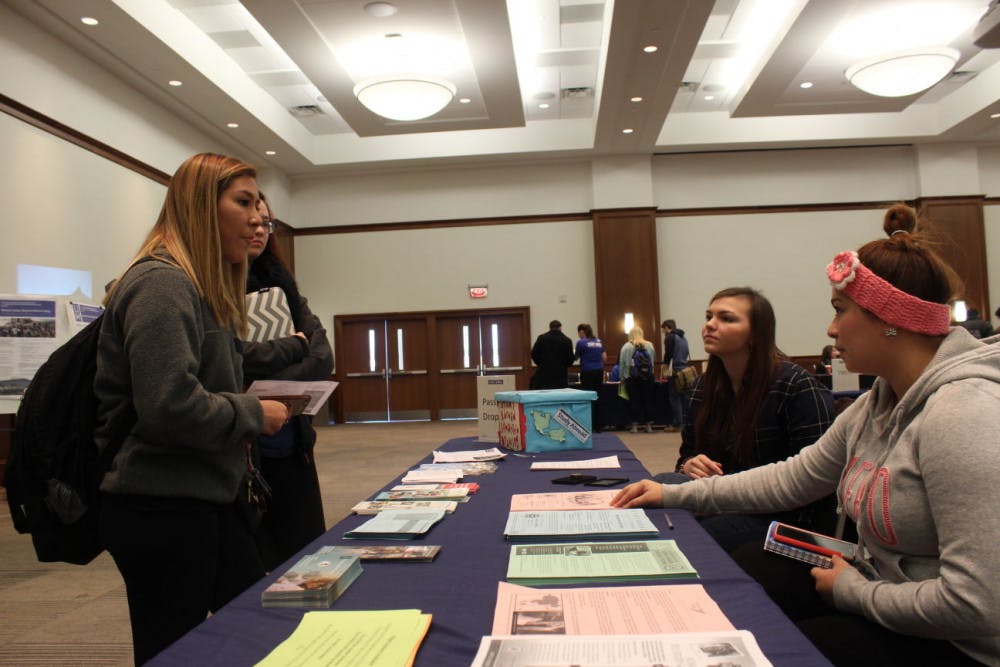
Psychology major Jennifer Rice and foreign language major Michelle Sauceda hand out information
to interested students Brianna Palomaes and Katherine Camarna at the study aboard fair
Wednesday in the University Center Ballroom
Despite warnings about abroad travel due to terrorist attacks and disease, U of M students are not halting their study abroad dreams.
Central America has a level two alert issued to travelers because of the rapidly spreading Zika virus, via the Center for Disease Control.
The Zika virus is spread by mosquitoes and, if bitten, causes someone to have a fever with a rash, joint pain or red eyes that could last several weeks.
“What is good about the Zika virus is that it is not lethal, it’s just flu systems,†Roxane Coche, journalism professor, said. “The only thing that is bad is if you are pregnant. Your baby would be born with potential deformities. There may be other problems we don’t know about, so the fact that we don’t know what it might do in the future to unborn children is a problem.â€
The virus can be spread from a pregnant woman to her unborn baby, according to the CDC. There have been reports of a serious birth defect of the brain called microcephaly and other unfortunate pregnancy outcomes in babies of mothers who were infected with Zika virus while pregnant.
Knowledge of the link between Zika and these outcomes is still evolving.
“If the federal government in every big country participating in the Olympic games is not concerned about the virus, then why should we?†Coche said.
Katie Flynn studied abroad in Costa Rica, one area being affect by the Zika virus. However, she does not believe that people should be worried.
“I think people definitely should still go,†Flynn said. “I think they should take precautions, whether that is shots or mosquito repellent, but I don’t think it should detour them from going because there is a lot to be learned and experienced from going abroad.â€
Along with the Zika virus, terrorism is another concern. Â The world witnessed the beloved city of Paris fall victim to a brutal attack by the Islamic State group.
Proximity to recent terrorist attacks would usually send others away, but not Bradley Starnes, a U of M student who traveled Lille, France.
“If I was going to France tomorrow, as long as they would let me in, I would go,†Starnes said. “The point of terrorism is to spread terror, and we have to show them that they can not bother us. It is as much their job to spread fear as it is our job to spread hope and show that we are not afraid of them just because they attack one of our friends.â€
French professor Denis Grele has noted that the number of applications for the European summer program held at Lille Catholic University in Lille, France, only two hours away from Paris, has not seen a drop at all.
 “Today students realize that, no matter where you are going, you can be attracted anywhere,†Grele said.
The U of M study abroad office takes note of all the dangers going around and does their best to make sure students who study abroad are safe, said Rebecca Laumann, assistant director of international programs and study abroad. Â
“In our office we are connected to the U.S. Department of State’s website, where they send us alerts if there is a travel warning or advisory or a disease,†Laumann said. “We monitor sites like the CDC. There’s a lot of things going on in our office to make sure students are safe. We have a large orientation to tell students about traveling. You have a small program-specific orientation, where we really focus on where students are going and address any questions and concerns. We also stay in touch with students while they are there. A coordinator like us will be there to help the students and make sure they stay safe.â€






